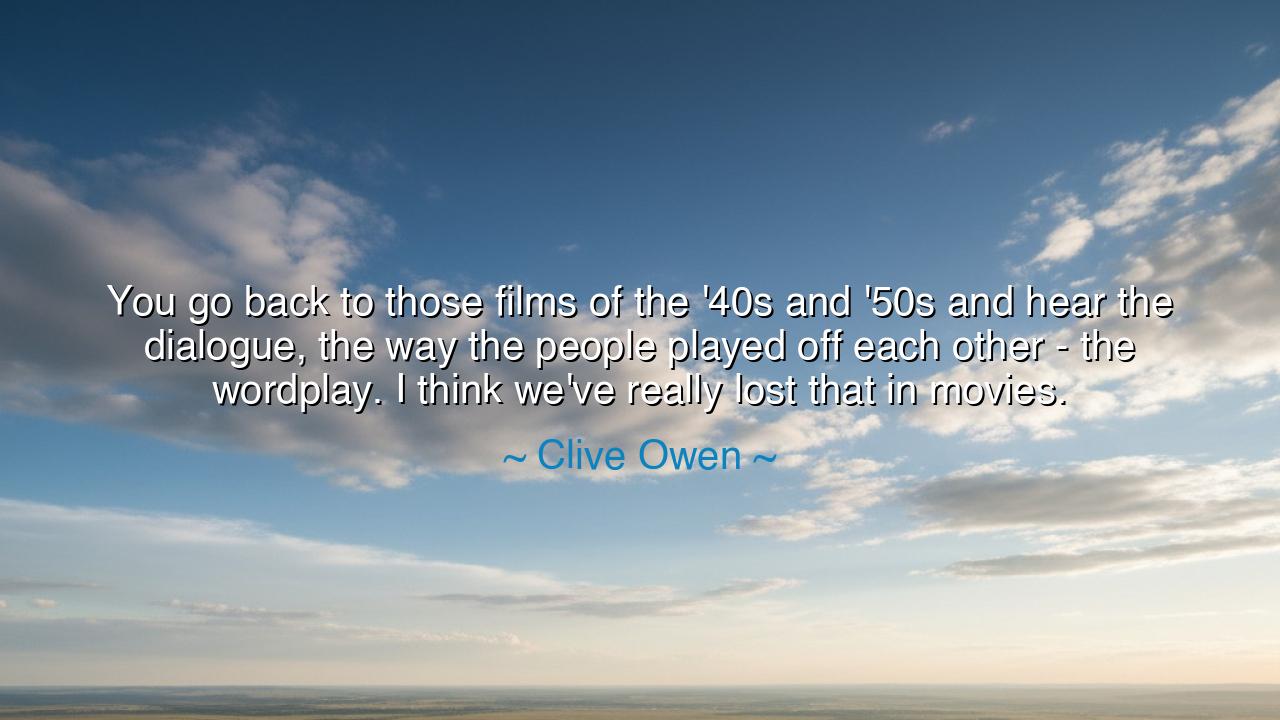
You go back to those films of the '40s and '50s and hear the
You go back to those films of the '40s and '50s and hear the dialogue, the way the people played off each other - the wordplay. I think we've really lost that in movies.






"You go back to those films of the '40s and '50s and hear the dialogue, the way the people played off each other - the wordplay. I think we've really lost that in movies." These words, spoken by Clive Owen, offer a deep reflection on the art of dialogue and the shift in how stories are told in cinema. In the golden age of film, particularly the 1940s and 1950s, movies were not just about what was seen on screen, but about the magic woven through words. The dialogue of that era was rich, sharp, and layered with meaning. It was a play of language, a dance between characters that was as much about rhythm and wordplay as it was about the plot. Owen’s lament is a call to remember that words hold power, and that in the rush toward spectacle and action, we have lost the elegance and intelligence that once defined cinema.
O Seekers of Truth, understand this: words have always been the vehicle of human connection, of culture, and of wisdom. In the films of the past, the dialogue was not simply a tool for moving the plot forward, but a performance in itself, a dance of wit, humor, and reflection. The great films of the '40s and '50s were built not only on the physicality of the actors but on their ability to engage in verbal combat, to play with language, and to challenge one another with every line spoken. In these exchanges, the true depth of the characters was revealed—not through grand gestures, but through their mastery of words, their ability to engage in the most intimate and intellectual of battles.
Consider the film noir classics of the time—The Maltese Falcon or Casablanca. The characters in these films did not simply speak; they sparred, they wove intricate webs of words that carried both meaning and subtext. Humphrey Bogart in Casablanca did not simply deliver his lines; he made them memorable. The sharp, quick exchanges between characters were filled with tension, wit, and emotion. In these moments of wordplay, the true nature of the characters was revealed, their desires and motivations laid bare. The dialogue became a tool not only for storytelling but for connecting with the audience on a deeper level. The power of a well-crafted line, spoken with intention and mastery, transcended the scene itself, creating an emotional resonance that carried far beyond the credits.
Think of William Shakespeare, the master of language, whose plays were not just stories of kings and lovers, but rich tapestries of wordplay, puns, and rhetoric. In Shakespeare’s time, the spoken word was the lifeblood of storytelling. His characters did not just speak—they played with language, often using it to conceal their true thoughts or to reveal deep truths. The dialogue was a battleground for power, wit, and strategy. It was through wordplay that Shakespeare’s characters came alive, their complexities unfolding with every line. The power of language, the ability to command a conversation, to twist it with wit or to lay it bare with honesty, has always been at the core of human connection.
O Children of the Future, hear this truth: do not underestimate the power of words. In our rush to create visual spectacles, we may forget the beauty that lies in the subtlety and craft of language. Great stories are not just told with images, but with the words that shape them. Clive Owen’s lament is a call to return to an age where dialogue was as important as the visual elements of a film, a reminder that wordplay, the art of speaking and listening with depth, holds the key to connecting us with one another. The true power of a story lies not only in the images we see but in the words that shape our understanding of the world and ourselves.
Yet, beware, O Seekers, for the shift away from dialogue-rich stories is not a trend isolated to the world of film. In our world today, we have become accustomed to speed, to brevity, to communication that is quick and shallow. We have lost the art of conversation, the ability to engage with one another in a meaningful and thoughtful way. We text, we tweet, we scroll through endless words without truly listening. The richness of language, of dialogue, has been replaced by convenience. Yet, we must remember that the depth of human connection, of storytelling, lies in the time we take to carefully craft and listen to words.
Lesson: The wisdom of Clive Owen speaks to the power of language—of words that carry not only the weight of meaning but the beauty of craftsmanship. In the rush of modern life, do not forsake the art of thoughtful conversation and wordplay. True greatness lies not only in the visuals we create but in the depth of the dialogue we share. Practical action: In your own life, take time to engage with others in meaningful conversation. Learn the art of listening and speaking with intention. Craft your words with care, and recognize that language is not only a tool for communication, but a bridge that connects the heart, the mind, and the soul.






AAdministratorAdministrator
Welcome, honored guests. Please leave a comment, we will respond soon